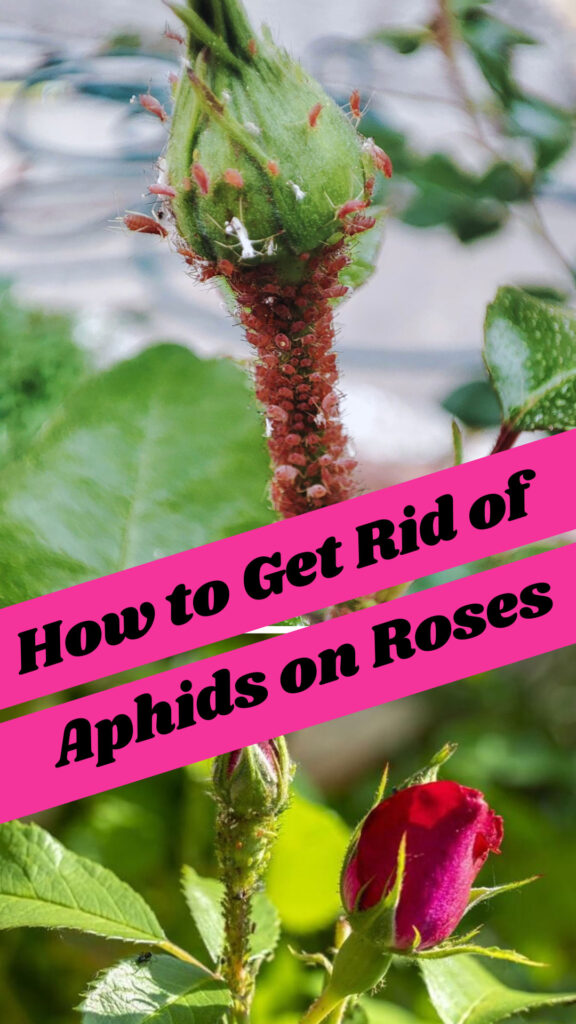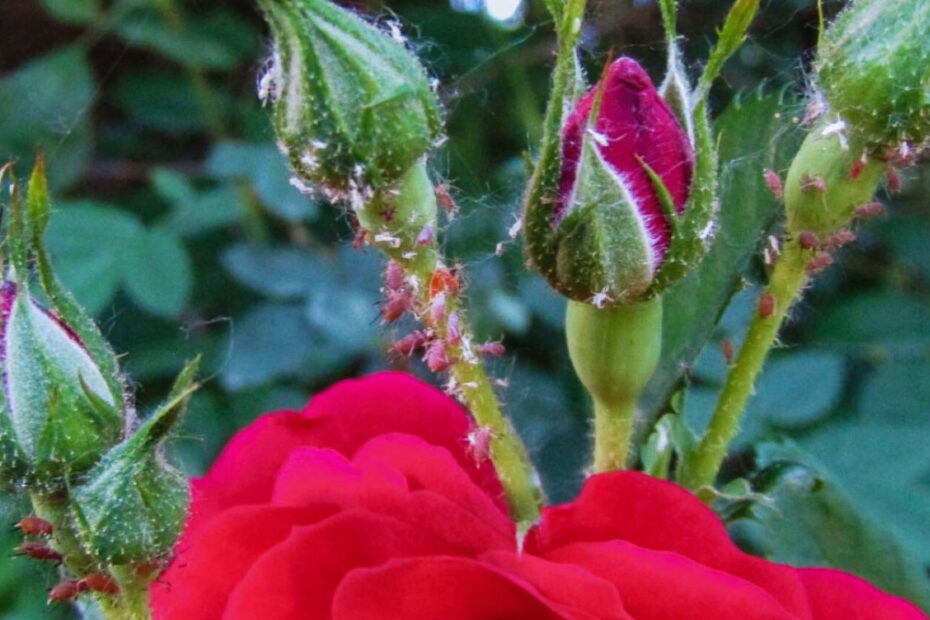Roses are the crown jewels of any garden, but aphids can quickly turn your blooming paradise into a nightmare. These tiny pests suck the life out of your plants, leaving behind a trail of damage and frustration. If you’re tired of battling these unwelcome guests, you’re not alone.
Key Takeaways
- Identify aphid infestations early by looking for curled or yellowing leaves, sticky honeydew, and the presence of ants or visible aphid clusters.
- Natural remedies such as introducing beneficial insects (e.g., ladybugs, lacewings) and homemade sprays (e.g., soapy water, neem oil) are effective and eco-friendly options for controlling aphids on roses.
- Chemical treatments like insecticidal soaps and systemic insecticides offer targeted solutions for severe aphid infestations, providing long-term control when used as directed.
- Regular monitoring and companion planting (e.g., herbs like dill, fennel, and aromatic plants like garlic) can prevent aphid infestations by creating an unfavorable environment for these pests.
- Employing a combination of natural remedies, chemical treatments, and preventive measures ensures healthier and more vibrant roses, helping gardeners maintain the beauty of their gardens.

Understanding Aphids on Roses
Aphids, small sap-sucking insects, often plague rose gardens, threatening the health and beauty of your plants. Identifying and understanding these pests is crucial to effective management.
What Are Aphids?
Aphids are tiny, soft-bodied insects usually less than 1/4 inch in length. They come in various colors, including green, black, brown, and yellow.
Key Characteristics:
- Body Shape: Pear-shaped
- Antennae: Long and slender
- Cornicles: Two tube-like structures on their hind end
These pests feed on plant sap by piercing the plant tissue and sucking out the juices, which can weaken the plant, causing stunted growth and deformities.
Signs of Aphid Infestation
Recognizing an aphid infestation early can save your roses from significant damage. Look for these common signs:
- Curled Leaves: Leaves may curl and become distorted due to aphid feeding.
- Yellowing: Plant segments might turn yellow or pale as aphids extract sap.
- Honeydew: A sticky substance on leaves and stems produced by aphids, often leading to mold growth.
- Presence of Ants: Ants are attracted to the honeydew and may indicate aphid activity.
- Visible Aphids: Clusters of tiny aphids on new growth, leaves, and buds.
Early detection and understanding of aphids can help you take quick action to protect your rose plants.
Natural Remedies to Get Rid of Aphids
Natural remedies offer effective and eco-friendly solutions for controlling aphids on your roses. These methods keep your garden safe and ensure the health of your plants.
Introducing Beneficial Insects
Many gardeners use beneficial insects to naturally control aphid populations. These insects prey on aphids and help manage infestations.
Key Beneficial Insects:
- Ladybugs: Voracious predators of aphids. One ladybug can eat 50 aphids a day.
- Lacewings: Lacewing larvae, known as “aphid lions,” consume hundreds of aphids in their larvae stage.
- Parasitic Wasps: These wasps lay eggs inside aphids; hatching larvae consume the aphids from within.
- Hoverfly Larvae: Larvae feed on aphids, reducing their numbers significantly.
Invite these insects by planting foliage like dill, fennel, and yarrow, which attract them to your garden.
Homemade Sprays and Solutions
Homemade sprays offer a chemical-free way to combat aphids. These solutions can be made using simple household ingredients that are eco-friendly yet effective.
- Soapy Water: Mix 2 teaspoons of mild dish soap with 1 quart of water. Spray directly on aphids to break down their protective outer coating, causing them to dehydrate.
- Neem Oil: Combine 2 tablespoons of neem oil with 1 gallon of water. This disrupts aphid feeding and reproduction.
- Garlic Spray: Blend a few garlic cloves with water, strain, and spray on plants. Garlic’s strong smell repels aphids.
- Alcohol Spray: Mix 1 part isopropyl alcohol with 7 parts water. Spray on aphids to dry them out.
Apply these sprays in the early morning or late evening to prevent leaf scorch from the sun. Always test on a small section of the plant before full application to ensure compatibility.
These natural remedies are effective when used consistently and in combination with good gardening practices, contributing to the health and vibrancy of your roses.
Chemical Treatments for Aphid Control
Chemical treatments offer targeted solutions for aphid infestations on roses. These treatments can be highly effective and are especially useful when dealing with severe infestations. Here are specialized chemical options:
Insecticidal Soaps
Insecticidal soaps target soft-bodied insects, including aphids. They work by disrupting the cell membranes of the pests, causing dehydration and death.
- Ingredients: Typically made from potassium salts of fatty acids.
- Application: Spray directly onto aphids; ensure thorough coverage on leaves, stems, and buds.
- Safety: Generally safe for humans, pets, and plants when used as directed.
Steps to Use Insecticidal Soaps:
- Dilute the Soap: Mix the insecticidal soap concentrate with water according to the manufacturer’s instructions.
- Test Spray: Test the spray on a small leaf section to ensure no adverse reactions.
- Apply Thoroughly: Spray the mixture directly on aphids, covering all plant parts.
- Repeat as Needed: Reapply every 7-10 days if infestation persists.
Systemic Insecticides
Systemic insecticides work by being absorbed into the plant’s vascular system. When aphids feed on the sap, they ingest the insecticide and die.
- Ingredients: Commonly contain imidacloprid or dinotefuran.
- Application: Applied as a soil drench, granules, or foliar spray.
- Effectiveness: Offers long-term control, usually up to several weeks.
- Choose the Right Product: Select a systemic insecticide labeled for aphid control on roses.
- Read Instructions: Follow dosage and application instructions on the product label.
- Apply to Soil or Leaves: For soil drench, pour the solution around the plant base; for sprays, coat the foliage.
- Monitor Plants: Track effectiveness, checking for any aphid activity over the next few weeks.
By integrating these chemical treatments into your garden care routine, you can effectively manage aphid populations and maintain the health and beauty of your roses.
Preventative Measures
To keep aphids off your roses, implementing proactive steps can be highly effective. Employing these measures creates an environment less inviting to these pests, minimizing the need for reactive treatments.
Regular Monitoring
Constant vigilance is key to preventing aphid infestations. Checking your roses frequently allows early detection and rapid response to pest issues. Aim to:
- Inspect Leaves and Stems: Look for curled or yellowing leaves and the presence of sticky honeydew, especially on new growth.
- Identify Predators: Notice beneficial insects like ladybugs and lacewings. Their presence often indicates a balanced ecosystem.
- Monitor Weather Conditions: Aphids thrive in cool, moist environments. Increase inspections during these periods.
By making regular inspections part of your garden routine, you catch infestations early and address them before they escalate.
Companion Planting
Combining certain plants with your roses can deter aphids naturally. Companion planting introduces beneficial plant relationships that repel pests and attract helpful insects. Consider planting:
- Herbs: Plant dill, fennel, or cilantro near roses to draw aphid predators.
- Flowering Plants: Include yarrow, marigolds, or nasturtiums to attract ladybugs and hoverflies.
- Aromatic Plants: Use garlic, chives, and onions to repel aphids with their strong scent.
By integrating these plants, you enhance your garden’s pest resistance and create a more diverse and balanced ecosystem.
Conclusion
Tackling aphids on your roses doesn’t have to be a challenging job. By understanding the characteristics of aphids and recognizing early signs of infestation, you can take swift action to protect your plants. Embrace natural remedies like beneficial insects and homemade sprays for an eco-friendly approach. For more severe cases, consider using targeted chemical treatments to effectively manage aphid populations. Regular monitoring and preventative measures can also play a crucial role in keeping your rose garden vibrant and healthy. With these strategies, you’ll be well-equipped to maintain the beauty and health of your roses year-round.
Frequently Asked Questions
What are aphids?
Aphids are small, sap-sucking pests that can severely damage rose plants and other garden flora. They have pear-shaped bodies, long antennae, and come in various colors.
How can I identify an aphid infestation on my roses?
Aphid infestations are signaled by curled leaves, yellowing plant segments, the presence of honeydew, and visible clusters of aphids on the plant.
What natural remedies can I use to control aphids?
You can use beneficial insects like ladybugs, lacewings, and parasitic wasps, as well as homemade sprays made from soapy water, neem oil, garlic spray, and alcohol spray to control aphids naturally.
How can I attract beneficial insects to my garden?
Planting foliage such as dill, fennel, and yarrow can attract beneficial insects that prey on aphids, helping to naturally manage infestations.
What chemical treatments are effective against aphids?
Insecticidal soaps and systemic insecticides can effectively manage aphid populations. Insecticidal soaps disrupt aphids’ cell membranes, while systemic insecticides are absorbed into the plant’s system, killing aphids when they feed on the sap.
How often should I inspect my roses for aphids?
It’s recommended to inspect your roses regularly, keeping an eye out for signs of infestation such as curled leaves, yellowing segments, and clusters of aphids.
What preventive measures can keep aphids off my roses?
Regular monitoring, companion planting with herbs and aromatic plants, and identifying beneficial predators are crucial preventive steps. Additionally, monitoring weather conditions favorable to aphid growth can help keep aphids at bay.
How do homemade sprays work against aphids?
Homemade sprays, such as soapy water or neem oil, work by smothering the aphids or disrupting their biological functions. When used consistently, these sprays can effectively reduce aphid populations.
